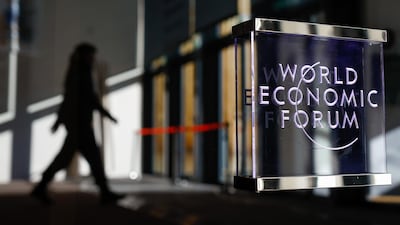Notwithstanding the geopolitical uncertainty in certain parts of the Middle East, larger global trends have intimate relevance for the region’s long-term competitiveness. The world is being transformed by seismic developments around technology, climate and the need for more inclusive economic and social systems. There is a real risk that many in the region will miss out on these momentous shifts, given the gravitational pull of current geopolitical developments.
At the same time, we are entering a year when, for the first time, an Arab or Middle East country is chairing the G20. Saudi Arabia’s G20 Presidency therefore offers a timely opportunity to bring these larger trends into sharper focus for all stakeholders in the future of the region.
It is in this context that we are glad to bring together, on the occasion of the World Economic Forum’s 50th Annual Meeting in Davos, a group of leaders from government, business and experts in the form of a new Stewardship Board on the Future of the Middle East and North Africa (Mena). Comprising forward-leaning personalities and entities, we believe this group’s contribution can help shine light on these strategic priorities and amplify the work done by many outstanding thinkers and practitioners.
Our priorities include:
Shaping technology governance
With one of the highest rates of internet adoption in the world and with a growing tech-savvy population, the Fourth Industrial Revolution is transforming the region at an unprecedented pace. Data represents the essential variable that can widen business opportunities to larger digital markets and unlock harmonised economic growth across the region. However, the lack of the enabling protocols to accelerate cross-data flows and the fragmented regulatory landscape in the region is hindering the true digital potential of the Mena region.
Taking the World Economic Forum’s Network for the Fourth Industrial Revolution as a foundation, the Affiliated Centres in Saudi Arabia and in the UAE will develop, pilot and scale human-centred governance tools to fully harness the potential of emerging technologies for the region’s economic growth.
Future of jobs in the Arab world
As the Fourth Industrial Revolution creates new pressure on labour markets and on education systems, lifelong learning and continuous reskilling initiatives are crucial to both allow current and future workforce to remain competitive for the future of work, and for companies to have the skilled talent they need to ensure their sustainability in the long-term.
Leveraging the Closing the Skills Gap Accelerators in Oman and in the UAE and contributing to the Forum’s Reskilling Revolution challenge to upskill and reskill 1 billion people by 2030, the Future of Jobs in the Arab World aims to advance public-private collaborations to catalyse systemic change and foster lifelong employability across the region.
Scaling social entrepreneurship
Overcoming traditional barriers and harnessing emerging technologies to address the dynamic needs of a growing population in the Mena region, start-ups have a far-reaching ripple social effect and they are filling the vacuum left by governments in areas like education, health and energy. However, due to the lack of an underlying regional supporting ecosystem, their impact is still limited to a local perimeter.
Building on the World Economic Forum’s work with the community of the 100 Arab start-ups, our endeavour is to create a regional model for social entrepreneurship to scale and amplify their value for the society across all spectra.
Unlocking the potential of Arab women
As identified by the World Economic Forum Gender Gap Report, accelerating the inclusion of women in the workforce and harnessing gender parity opportunities could add $2.7 trillion to the region’s economy by 2025.
Leveraging the many home-grown reforms in this context, of which Egypt has been a leading example with the first Closing the Gender Gap Accelerator in the Mena region, we aim to scale those efforts on a regional level and to design new policies that can bring about societal change to ultimately unlock the full economic gender inclusion.
Environmental stewardship
The Mena region is one of the most water-stressed in the world and is going to be severely affected by climate change and raising temperatures, while at the same time it faces chronic waste and pollution problems. This crisis is urgent and requires a fundamental step-change in order to avert its detrimental impact on the region and on its future generations.
Responding to this imperative, as the Mena Stewardship Board we want to foster environmental stewardship across the whole region and advance innovative and creative solutions to address the dire consequences of climate change. In this space for instance, the pioneering work of the Scale 360 project has the unique mission to accelerate the transition to a circular economy through innovations of the Fourth Industrial Revolution.
A new vision for economic integration
The Middle East, North Africa and Pakistan (Menap), though one of the most populous regions in the world, contributes only 3.4 per cent of the global gross domestic product and its untapped economic opportunities are estimated to be around $2.7tn.
This gap is mainly due to an underdeveloped private sector, whose true potential is hindered by barriers to trade and lack of economic cooperation among countries.
As a genuine desire for connectivity is growing, also in the context of the digital opportunities offered by the Fourth Industrial Revolution, we are convening a group of future-oriented regional and international business leaders to design and deploy solutions that can widen access and mobility to investors and citizens for the Menap economy to thrive in the years to come.
Mirek Dušek is head of Middle East and North Africa, World Economic Forum; Rania Al-Mashat is Egypt's Minister of International Cooperation; Alain Bejjani is chief executive officer, Majid Al Futtaim. This article is part of the World Economic Forum’s Annual Meeting in Davos-Klosters, Switzerland, 21-24 January 2020

